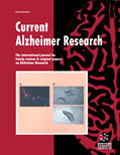To find the most relevant journal, please insert appropriate keyword to facilitate search.
Search Results: CAR

Current Alzheimer Research
ISSN: 1567-2050 (Print)
eISSN: 1875-5828 (Online)

ISSN: 1567-2050 (Print)
eISSN: 1875-5828 (Online)